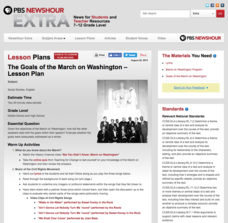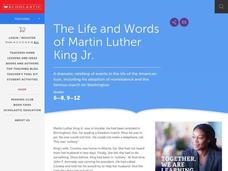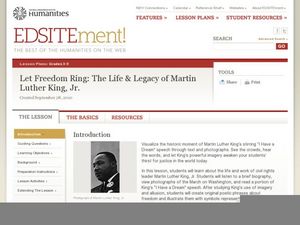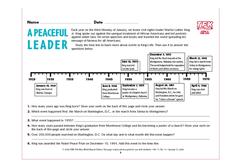National Endowment for the Humanities
The Freedom Riders and the Popular Music of the Civil Rights Movement
The Civil Rights Movement of the 1960s marched to its own beat—literally. Using songs from the era, as well as other primary sources such as King's "I Have a Dream" speech, class members analyze lyrics to discover how music and protest...
Curated OER
Give Me Liberty or Give Me Freedom
Welcome to America, the land of liberty and freedom. Examine the ways in which the terms liberty and freedom have been used in the United States. After researching and analyzing quotations from the past and present, students create an...
PBS
The Goals of the March on Washington
Who else had a dream other than Martin Luther King, Jr.? Pupils explore civil rights leaders in a fourth lesson out of a series of five about people who paved the way to freedom for African Americans. The inquiry-based unit has your...
Newseum
The Freedom to Make a Change
As part of a study of the First Amendment, young historians research instances when individuals or groups used the First Amendment to change the United State's laws or policies. Teams are each assigned a different case study. With the...
National Park Service
Civil War to Civil Rights: From Pea Ridge to Central High
Explore how the Civil War impacted the Civil Rights Movement. Class members complete a series of projects for a unit that uses a layered curriculum approach to learning.
Curated OER
Marching to Freedom: PowerPoint Presentation debating for or against going to war
Fourth graders present research on war. In this debate instructional activity, 4th graders create a power point presentation debating for or against the American Revolution. Students share their presentations with the class.
Curated OER
Fill-In : March Events in the News
What happened on March 13, 1868? What happened on March 21, 1965? Eager readers fill in the missing historical event occurring on one day in March from 1862 - 1995. There are 31 events each occurring on a different day in March. This is...
Curated OER
Marching For Freedom
Students appreciate the sacrifices that people from across the country made to ensure that all citizens could exercise their constitutional right to vote. They access excellent websites and documents imbedded in this plan to guide their...
Stanford University
Lesson Plan: The Children's Crusade and the Role of Youth in the African American Freedom Struggle
Young people played significant roles in the Civil Rights movement. Class members examine the contributions of Barbara Johns, Claudette Colvin, Mary Louise Smith, and the children of Birmingham,...
Albert Shanker Institute
Economic Causes of the March on Washington
Money can't buy happiness, but it can put food on the table and pay the bills. The first of a five-activity unit teaches pupils about the unemployment rate in 1963 and its relationship with the March on Washington. They learn how to...
Scholastic
The Life and Words of Martin Luther King, Jr.
Here is a precise article explaining chronological events that led Martin Luther King, Jr. to march for freedom and civil rights.
Reading Through History
The March on Washington
How does marching get a point across to the government? Teach pupils about civics, human rights, and freedom of speech using the resource about the March on Washington. After reading, learners complete multiple-choice and short-answer...
Curated OER
Let Freedom Ring: The Life & Legacy of Martin Luther King, Jr.
Learners use text and photos to visualize the delivery of Dr. Martin Luther King, Jr.'s historic "I Have A Dream" speech. They analyze Dr. King's speech for examples of imagery and allusion and create original poetry and illustrations...
PBS
March on Washington: A Time for Change
Young historians conclude their study of the events that lead up to and the planning for the March on Washington. After examining videos and primary source documents, they consider the civil rights objectives that still need to be...
Cornell College
Dred Scott v. Sandford Supreme Court Decision
Dred Scott was a harbinger of the Civil War. An enslaved man claimed freedom because his owner had taken him into free territory. Not only did the Supreme Court rule that Dred Scott and his wife were to remain enslaved, but it also ruled...
Facing History and Ourselves
The Importance of a Free Press
"Congress shall make no law . . . abridging the freedom of speech, or of the press;. . ." Why is this guarantee of free speech and a free press the First Amendment to the US Constitution? Why are these rights so essential to a democracy?...
Stanford University
Civil Rights or Human Rights?
Young citizens consider the American civil rights movement as part of the global struggle for human rights. After using a timeline activity to learn about the major events in the civil rights movement, class members study Malcolm X's...
Curated OER
Picturing Freedom: Selma-to-Montgomery March, 1965
Students analyze primary sources to investigate the Civil Rights Movement. In this Civil Rights lesson, students explore the passage of Voting Rights Act of 1965 and how photojournalism impacted the passage of the legislation. Students...
Facing History and Ourselves
Laws and the National Community
When it comes to the law, is justice always served? Teach scholars about how law sometimes enables prejudice of entire groups of people with a unit on World War II that includes a warm-up activity, analysis of primary sources,...
Curated OER
Adding to the Picture: The 1963 March on Washington
Who do your scholars imagine when they think about the civil rights movement? If only a few faces come to mind, this lesson will expand their concepts of the movement's leaders. Learners examine an image of the 1963 March on Washington,...
Time For Kids
A Peaceful Leader
The legacy of Dr. Martin Luther King, Jr's life and message is just as important today as it was in his lifetime. Introduce elementary learners to the movement for civil rights with a timeline of Dr. King's life, as well as comprehension...
Kentucky Department of Education
Kentuckians in the Civil War Era: Constructed Response Essay
What part did Kentucky play in the Civil War? A constructed response essay assignment tests to ensure scholars understand the concepts and the arguments for the causes of the Civil War. Learners must read a primary source quote and then...
K12 Reader
MLK: Complete the Speech
Take a close look at a few paragraphs of Martin Luther King, Jr.s' famous speech, "I Have a Dream." Class members fill in the missing words using the bank of words provided and then respond to a question about the speech and modern day...
Curated OER
Cartoons for the Classroom: Freedom is not Universal
In this current events worksheet, students analyze political cartoons that feature caricatures of political leaders that have been challenged. Students respond to 3 talking point questions.

























